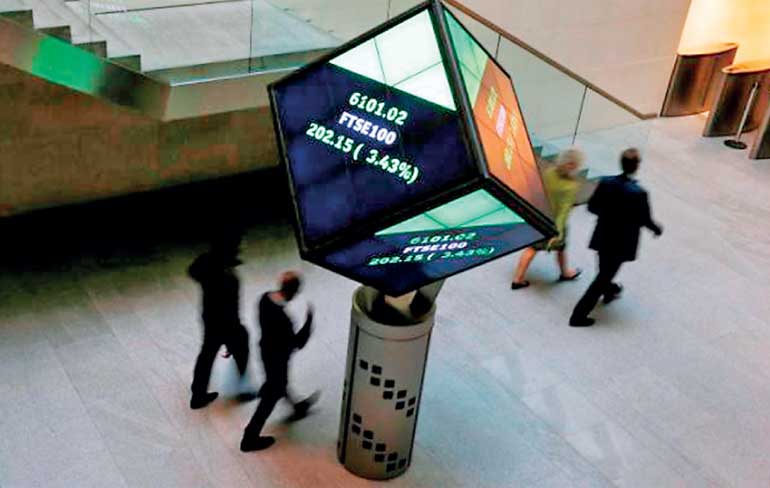Thursday Feb 19, 2026
Thursday Feb 19, 2026
Tuesday, 19 April 2016 00:03 - - {{hitsCtrl.values.hits}}
LONDON (Reuters): A dive in oil prices sent stock markets lower on Monday after producers meeting in Qatar failed to agree on a plan to curb global supply, quashing the more optimistic tone which prevailed for much of the past week.
Japan’s Nikkei index led the way, tumbling more than 3% after a devastating earthquake in the southwest of the country, with signs from a summit in Washington that other Group of 20 governments oppose intervention against the strength of the yen also playing a role.
Europe’s major exchanges all fell by more than half a percent on opening, while markets in Hong Kong and Shanghai lost around 1%.
Oil prices were down 4% on the day, with U.S. crude falling back below $40 for the first time in a week.
Some 18 oil-exporting nations, including OPEC members, had gathered in Doha, the capital of Qatar, over the weekend in an attempt to agree to stabilise output at January levels until October 2016. The pact fell apart after Saudi Arabia demanded that Iran join in.
 People walk through the lobby of the London Stock Exchange in London, Britain
People walk through the lobby of the London Stock Exchange in London, Britain
“The short-term impact on prices is clear to see this morning, while longer term it’s hard to see supply slowing much this year,” said Joe Rundle, Head of Trading at ETX Capital in London. “In the end it proved just too much for the Saudis to cut a deal with Iran.”
The plunge in crude oil prices took a large slice out of commodity currencies, pushing the dollar almost 1% higher against its Canadian counterpart to C$1.2926.
The yen, traditionally a target for capital in times of global stress, hit a 3-year high against the euro. It rose half a percent against the dollar but was still well short of highs of 107.63 yen per dollar hit a week ago.
The 7.3 magnitude quake struck early on Saturday and was centred in Japan’s Kumamoto prefecture, an important manufacturing hub.
Shares of Sony Corp fell almost 7% after the electronics giant said its image sensors plant in Kumamoto would remain suspended. Toyota Motor Corp tumbled 4.8% after suspending production at plants across Japan due to disruptions to its supply chain.
“Many are waiting for the dust to settle as it is not yet possible to quantify the damage in its entirety,” said Martin King, Co-Managing Director at Tyton Capital Advisors.
One big exception to the rule was Brazil, where stock markets are expected to react euphorically to a vote to impeach President Dilma Rousseff that looked set to force her from office after 13 years of leftist Workers Party rule.
Brazil’s stocks and currency have been among the world’s best-performing assets in recent weeks on growing bets that Rousseff would be removed from office, allowing her successor to adopt more market-friendly policies.
“Brazilian assets will most likely react positively to news of Rouseff’s impeachment,” analysts from retail broker Swissquote said in a note. “But we expect the overall risk-off sentiment to cap the potential gains.”